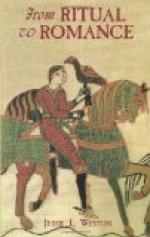(e) In three cases the misfortunes and wasting of the land are the result of war, and directly caused by the hero’s failure to ask the question; we are not dealing with an antecedent condition. This, in my opinion, constitutes a marked difference between the two groups, which has not hitherto received the attention it deserves. One aim of our present investigation will be to determine which of these two forms should be considered the elder.
But this much seems certain, the aim of the Grail Quest is two-fold; it is to benefit (a) the King, (b) the land. The first of these two is the more important, as it is the infirmity of the King which entails misfortune on his land, the condition of the one reacts, for good or ill, upon the other; how, or why, we are left to discover for ourselves.
Before proceeding further in our investigation it may be well to determine the precise nature of the King’s illness, and see whether any light upon the problem can be thus obtained.
In both the Gawain forms the person upon whom the fertility of the land depends is dead, though, in the version of Diû Crône he is, to all appearance, still in life. It should be noted that in the Bleheris form the king of the castle, who is not referred to as the Fisher King, is himself hale and sound; the wasting of the land was brought about by the blow which slew the knight whose body Gawain sees on the bier.
In both the Perlesvaus, and the prose Perceval the King has simply ‘fallen into languishment,’ in the first instance, as noted above, on account of the failure of the Quester, in the second as the result of extreme old age.
In Chrétien, Manessier, Peredur, and the Parzival, the King is suffering from a wound the nature of which, euphemistically disguised in the French texts, is quite clearly explained in the German.[20]
But the whole position is made absolutely clear by a passage preserved in Sone de Nansai and obviously taken over from an earlier poem. This romance contains a lengthy section dealing with the history of Joseph ‘d’Abarimathie,’ who is represented as the patron Saint of the kingdom of Norway; his bones, with the sacred relics of which he had the charge, the Grail and the Lance, are preserved in a monastery on an island in the interior of that country. In this version Joseph himself is the Fisher King; ensnared by the beauty of the daughter of the Pagan King of Norway, whom he has slain, he baptizes her, though she is still an unbeliever at heart, and makes her his wife, thus drawing the wrath of Heaven upon himself. God punishes him for his sin:
“Es rains et desous
l’afola
De coi grant dolor endura."[21]
Then, in a remarkable passage, we are told of the direful result entailed by this punishment upon his land:




